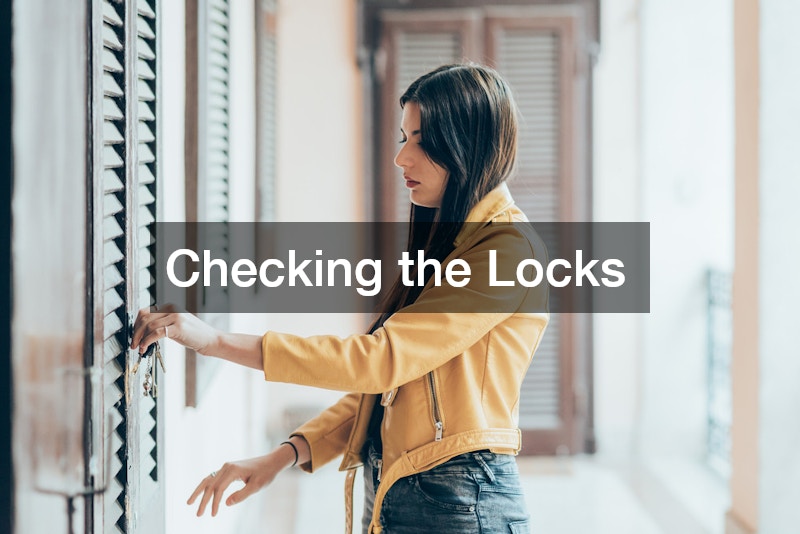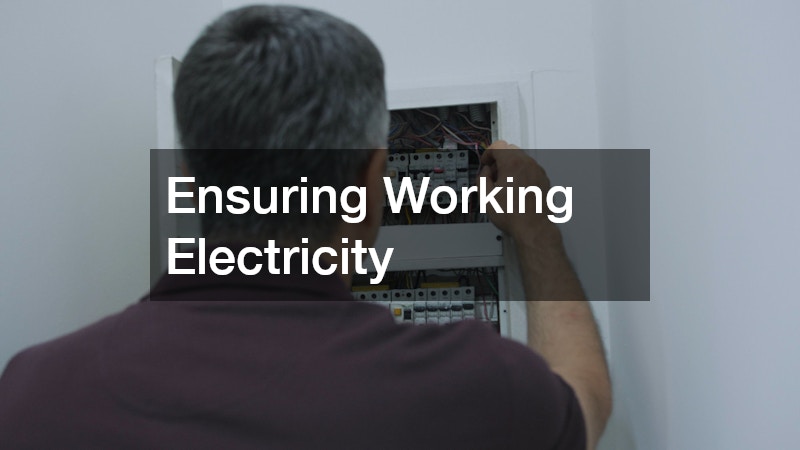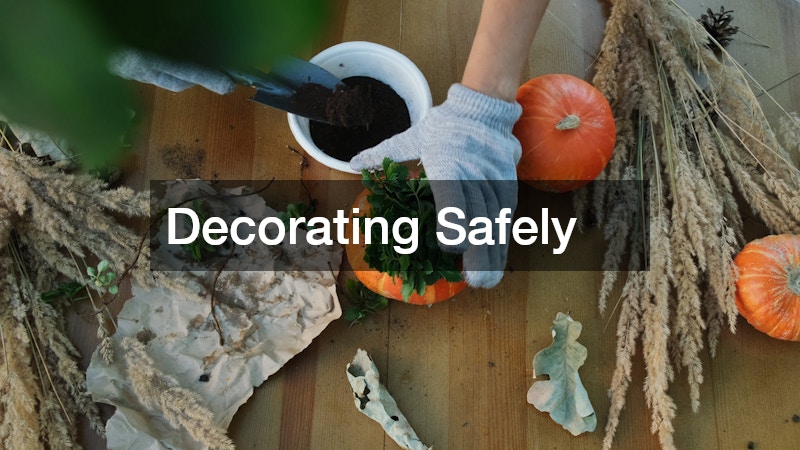Ensuring your home is safe is not just a matter of comfort, but a fundamental necessity for protecting yourself and your loved ones. Safety is an essential aspect of any home environment, as it directly impacts your family’s well-being, happiness, and peace of mind. By addressing various home safety topics, you can reduce risks, prevent accidents, and create a sanctuary in which your family can thrive.
From the functionality of locks to the importance of maintaining a clean water supply, each aspect plays a crucial role in safeguarding a home. Furthermore, with unpredictable threats such as natural disasters, intruders, and health emergencies, the need for thorough safety measures has never been more crucial. This article explores key home safety topics that every homeowner should prioritize and address to create a secure and healthy living space.
Checking the Locks

One of the fundamental home safety topics revolves around the condition of your door locks. Locks are the first line of defense against potential intruders, and having fully functional locks can deter theft and unwanted access. Regular inspections and timely lock repairs can ensure that your home remains a secure haven for you and your family.
Different types of locks serve various purposes, and knowing which locks to invest in can significantly enhance your home security. Consider deadbolts, smart locks, and other high-security options for added protection. Furthermore, it’s essential to educate all family members on how to use these locks properly, ensuring that they understand the importance of securing doors when leaving or arriving at home.
In conclusion, by consistently addressing the state of your locks and performing necessary repairs, you are actively contributing to your home’s overall safety. A strong lock system paired with good practices, such as rekeying when moving in and ensuring all doors have matching keys, will create a more secure environment. Remember, no one should underestimate the importance of the simplest home safety topics, such as checking your locks regularly.
Keeping Your Pets Safe
Pets are not just animals; they are family members who require protection and care just as we do. One critical aspect of pet safety includes establishing secure environments, especially when you cannot supervise them directly. This makes a 4×6 dog kennel a valuable investment. A proper kennel not only keeps your pet safe but also provides a comforting retreat where they can relax.
In addition to buying adequate housing for your pets, keeping potentially harmful items out of their reach is essential. If ingested, cleaning supplies, hazardous materials, and certain plants can pose real risks to your furry friends. Therefore, home safety topics related to pets emphasize the need for creating pet-friendly spaces that avoid access to these dangers while ensuring they are kept physically secure.
Lastly, pet safety extends to making sure that any outdoor area is fenced and secure, preventing runaway incidents. Regular check-ins on your pet’s well-being, including vet visits and vaccinations, are essential to a holistic safety plan. Ultimately, keeping your pets safe enriches your home life and helps maintain harmony within your household.
Maintaining Clean Water
Clean water is essential for life, and ensuring a safe drinking supply is one of the most vital home safety topics to address. A water softener system can improve the quality of water, filtering out harmful minerals and contaminants. Not only does this system improve the taste of your water, but it also provides peace of mind regarding health standards.
Moreover, hard water can damage plumbing fixtures and appliances, leading to costly repairs and replacements. Installing a water softener mitigates this risk while extending the lifespan of your pipes and devices first. Homeowners should regularly test their water quality, allowing them to detect and rectify any issues before they escalate into significant health concerns.
Finally, maintaining clean water goes hand-in-hand with proper storage and handling practices. Ensuring that water is stored in clean containers and regularly changing filters in your water filtration system cultivates a safe drinking environment. Keeping an eye on these home safety topics will ultimately ensure that your family enjoys a pure and life-sustaining resource.
Ensuring Working Electricity

Electricity powers numerous aspects of modern living, making it vital to ensure that electrical systems in your home are safely maintained. Regular inspections of your electrical wiring, circuit breakers, and outlets can identify potential hazards before they cause harm. Therefore, engaging with professional electrical repair services is necessary to keep these systems functioning and safe.
Faulty electrical wiring can result in fires, shocks, and other dangerous situations, making ongoing maintenance a necessity rather than a luxury. Homeowners should be aware of the signs of electrical problems—such as flickering lights or frequent tripping of breakers—as these can indicate underlying issues that require immediate attention. Keeping an updated list of reliable services can save valuable time when these problems arise.
Furthermore, educating family members about electrical safety, including avoiding overloading outlets and using the appropriate wattage for light fixtures, can significantly reduce risks. Regularly replacing old extension cords and assessing electrical appliances for wear and tear can further uphold your home’s safety. Prioritizing these home safety topics leads to a well-protected home and mitigates the likelihood of electrical accidents.
Heating the Water
Having hot water readily available is essential for daily tasks, emphasizing the significance of water heater repair in home maintenance. A well-functioning water heater not only allows for comfortable showers and clean dishes but also supports overall hygiene in the household. Ensuring that water heaters are routinely serviced can prevent potential breakdowns and the associated inconvenience.
Moreover, homeowners should be conscious of the age and condition of their water heaters, as older units may become inefficient and may pose risks related to leaks or malfunctions. Establishing a regular maintenance routine can help in identifying issues before they escalate into costly repairs. Understanding the signs indicating an urgent need for repair, such as inconsistent temperatures or visible corrosion, is vital to maintaining a safe environment.
In addition, many modern heating systems offer energy-efficient technologies that can reduce utility bills while providing reliable hot water. Investing in this upgrade not only enhances comfort but also contributes to a more sustainable household. By addressing water heater maintenance as one of your key home safety topics, you ensure the safety and efficiency of an essential system in your home.
Repelling Bugs and Pests
Pests can pose a significant threat to the health and safety of your family, making pest control an essential aspect of home safety topics. Unwanted insects and rodents are carriers of diseases, and their presence can lead to food contamination and allergies. Consequently, maintaining a pest-free home not only protects physical health but also promotes mental well-being.
Professional pest control services can effectively manage and eliminate infestations, reducing the need for hazardous chemical applications that can pose risks to your family. Regular inspections and treatments can create a barrier that minimizes pest entry points and helps homeowners stay proactive against infestations. Additionally, maintaining cleanliness and sealing entry points in your home contributes to pest prevention.
Educating family members about the importance of reporting pest sightings and keeping living spaces tidy can further enhance your efforts. Special attention should be given to areas such as kitchens and bathrooms, where pests are likely to find food and moisture. Overall, addressing pest control as a priority aligns with broader home safety topics that safeguard well-being and promote a harmonious living environment.
Decorating Safely

While home improvement often focuses on aesthetics, ensuring that decorating efforts are conducted safely is an equally important topic. Painting services should always be completed with an eye toward safety, particularly given the potential for hazardous materials and fumes. Employing professionals with the appropriate knowledge and equipment can minimize risks during the painting process.
Moreover, using eco-friendly paints and materials contributes positively to indoor air quality. Familiarizing yourself with proper ventilation techniques during a painting project prevents the buildup of harmful vapors. Homeowners should also be mindful of the need to childproof areas where fresh paint is being applied to prevent accidents from slipping on surfaces or mishandling tools.
Finally, a well-researched decorating endeavor can greatly enhance the safety of a space. Using furnishings that are child and pet-friendly, avoiding sharp-edged furniture, and selecting non-toxic materials ensure that your home remains a safe haven. By integrating safe decorating practices into your home safety topics, you create a visually pleasing atmosphere that protects your loved ones.
Staying Cool During Summer
As summer temperatures rise, maintaining a cool indoor environment becomes essential for comfort and safety. Effective air conditioning maintenance is part of a broader discussion about home safety topics, ensuring that cooling systems function reliably. Regular check-ups of HVAC systems can prevent potential malfunctions during heat waves, which can lead to dangerous conditions, especially for vulnerable populations.
Aside from servicing your air conditioning unit, improving insulation and sealing leaks can further enhance energy efficiency. This practice helps regulate indoor temperatures, reducing energy waste and living costs. Homeowners should also invest in smart thermostats that allow for automatic adjustments to maintain desired temperatures while reducing strain on the system.
Additionally, educating family members about the signs of overheating, such as excessive sweating and fatigue, is crucial during the hotter months. Promoting hydration and awareness of heat-related illnesses should be part of summer safety discussions. By giving attention to air conditioning maintenance and effective cooling strategies, you can create a comfortable haven that supports health and well-being during the hottest months of the year.
Considering the Future
When assessing home safety topics, it’s essential to consider the significance of location and its long-term implications. Engaging with a local real estate agent can provide insights into prospective neighborhoods, including aspects such as crime rates, school districts, and available amenities. Making informed decisions about where to live ensures a higher quality of life and greater safety for your family.
Additionally, the future value of your home can be significantly influenced by location. Properties in safe, well-maintained neighborhoods generally appreciate better than those in less desirable areas. Engaging a local expert can also illuminate opportunities for improvements that further enhance property value and safety.
Lastly, the local community and support systems play a pivotal role in maintaining a safe environment. Knowing your neighbors fosters a sense of community and provides support, especially in emergency situations. Therefore, investing time in these considerations allows for informed, proactive choices about your home and its surroundings, ultimately leading to enhanced peace of mind.
Insuring Your Home

Homeowners insurance is a crucial aspect of home safety topics that protects your property and assets from various risks. Many homeowners overlook the significance of having adequate coverage, believing that it is an unnecessary expense. However, in the event of a disaster or theft, insurance can be a true lifesaver, helping to offset costs associated with damages or losses.
Understanding the types of coverage available, including liability, dwelling, and personal property protection, empowers homeowners to make informed decisions. Having clear communication with your insurance agent ensures you comprehend the terms of your policies and understand what is covered in case of emergencies. Re-evaluating your insurance coverage as your circumstances change—such as renovations or purchasing new valuables—is critical to ensure continuous protection.
Moreover, emergency funds and insurance should complement each other, providing a comprehensive safety net. While insurance covers loss post-incident, having a financial buffer can help manage immediate expenses during unexpected events. Prioritizing these home safety topics fosters a robust safety net that secures your property and your peace of mind for the future.
The safety of your home is non-negotiable and requires attention to various critical areas. From checking locks and ensuring clean water to understanding the value of homeowners insurance, addressing these home safety topics equips you with the knowledge needed to protect your family. By implementing the best practices discussed in this article, you create a secure environment where your loved ones can thrive.


